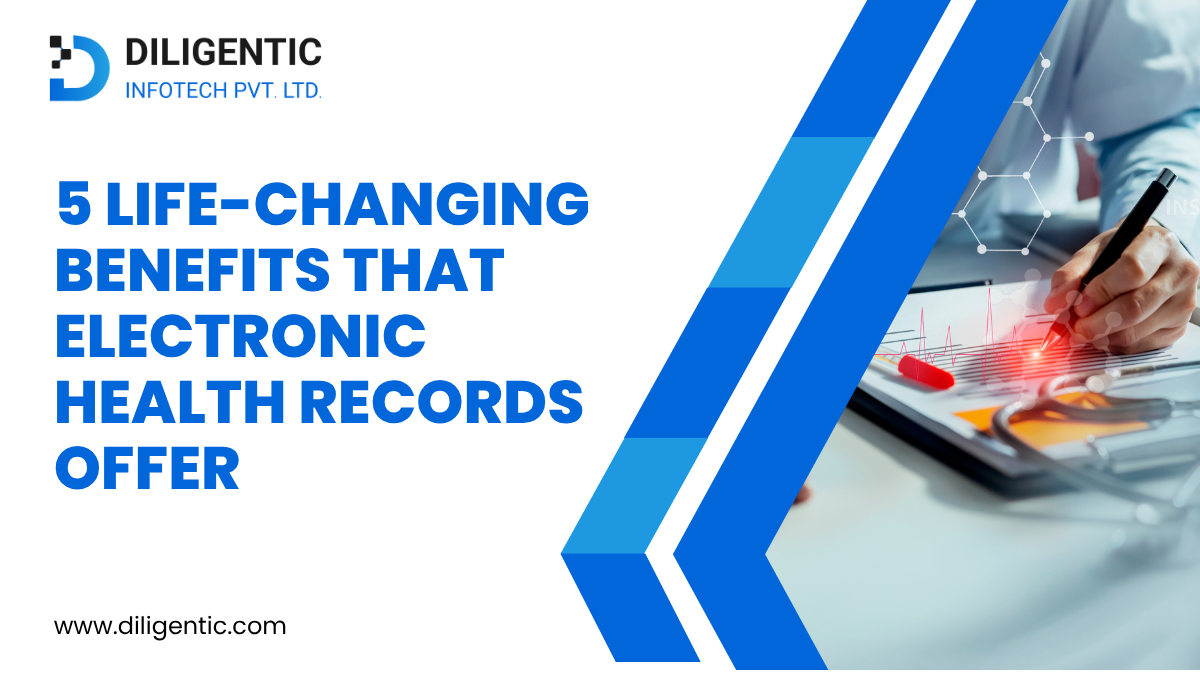SHARE

5 Life-Changing Benefits That Electronic Health Records Offer

Electronic Health Records (EHRs) go beyond simply digitizing paper documents; they serve as essential tools that enhance the quality and efficiency of healthcare services. From improving patient safety to enabling remote care and reducing admin overhead, EHR systems are transforming how healthcare works. In this article, you’ll learn the five biggest benefits of electronic health records, with real-world examples and simplified insights that matter.
Table of Contents
Benefits That Electronic Health Records Offer
1. Safer Decisions with Fewer Errors
The most important benefit of electronic health records is patient safety. When doctors have full access to accurate medical data at the right time, they make better choices.
- Built-in alerts: If a doctor prescribes a medicine that may react with something else the patient takes, the EHR software sends a warning.
- Records at hand: No need to rely on memory or scattered papers—EHR systems give doctors a full view of previous tests, allergies, surgeries, and conditions.
- Quick action in emergencies: When a patient comes in unconscious or can’t communicate, having their full medical history available in seconds can be life-saving.
Real-world example: A woman rushed to the ER for severe chest pain was allergic to a commonly used painkiller. Thanks to the EHR system, doctors saw the alert and avoided giving it, preventing a serious reaction.
2. Less Paper, More Time for Patients

Paperwork has always slowed down doctors and staff. EHR software cuts that clutter.
- Appointments and notes are automated. Doctors can quickly review notes, update diagnoses, and send prescriptions digitally.
- Billing gets easier. Charges and insurance codes are updated automatically, reducing claim rejections.
- No lost records. Physical files get misplaced often. Digital records are backed up and always accessible.
Example: A medium-sized clinic reduced patient waiting times by 35% after switching from traditional folders to an EHR system. With less time wasted finding files, doctors saw more patients daily.
3. Empowering Patients Through Access
Patients used to be left out of their care process. Electronic health records now give them access to their data and make healthcare more collaborative.
- Patient portals: With EHR systems, people can check their reports, upcoming appointments, and treatment history on their phone or computer.
- Secure communication: Patients can send follow-up questions or concerns directly to providers without booking unnecessary appointments.
- Greater understanding: Visual health records, medication schedules, and progress charts help people follow their care plans better.
Impact: When patients see their progress, they’re more likely to take medications regularly and make better health choices.
4. Remote Patient Monitoring Becomes Seamless
With rising demand for virtual care, EHR systems now support remote patient monitoring for regular conditions and post-surgery recovery.
- Live data collection: Devices like blood pressure monitors or glucose meters send data directly to EHRs.
- Real-time updates: Doctors can catch issues like a sudden drop in oxygen levels or rising sugar before they turn serious.
- Telehealth-ready: With integrated video and chat tools, virtual visits are supported by up-to-date medical information.
Example: A heart patient’s smartwatch detected an abnormal heart rhythm. The data, linked to the hospital’s EHR system, triggered a call from the care team and an immediate appointment. A serious event was prevented.
5. Better Security and Easier Compliance

Patient data is sensitive, and laws like HIPAA require it to be handled securely. EHR systems come with advanced tools to protect information.
- Role-based access: Only certain people can view or edit certain parts of the health record.
- Data encryption: Whether at rest or in motion, the data is protected from unauthorized access.
- Activity tracking: Every action that viewed or changed the file is logged for transparency and auditing.
Use case: After switching to a secure EHR system, a hospital passed its annual compliance audit with zero issues. They could easily track all file activity and prove data protection efforts.
Why Electronic Health Records Are Essential to Digital Transformation in Healthcare

EHR systems play a central role in the digital transformation in healthcare. They serve as the foundation that connects health services, like lab reports, imaging, pharmacy records, and billing, into one smooth workflow.
They’re part of a larger network of health information systems, where all data is stored, processed, and analyzed to improve outcomes. With the help of healthcare IT services, clinics can implement and maintain EHR solutions that match their needs.
Comparison Table: Traditional Records vs. EHR Systems
| Aspect | Traditional Records | Electronic Health Records |
|---|---|---|
| Data Access | Paper files, manual search | Real-time digital access from any device |
| Patient Engagement | Minimal interaction | Active participation via portals and messaging |
| Data Security | Prone to loss, theft, or damage | Encrypted, tracked, and securely stored |
| Remote Care Support | Not possible | Full support through device integration |
| Billing & Claims | Often delayed and manual | Automated and more accurate |
Integration with Healthcare IT Solutions
Leading healthcare IT solutions now offer customizable EHR software tailored to the size and goals of each medical practice. These systems are integrated with lab tools, appointment scheduling, and inventory tracking.
Some even feature predictive analytics that help doctors catch disease patterns early.
When combined with expert healthcare IT services, these systems help practices not only run smoother but also adapt to changing patient needs, especially in hybrid and remote care models.
To explore more about how connected technologies are shaping care delivery, check out our detailed article on the healthcare system and its evolving digital landscape.
Conclusion
Electronic health records go beyond simply being digital versions of paper files. They are the core of smart, connected healthcare. From increasing safety and reducing admin tasks to enabling remote care and protecting data, EHR systems offer real, measurable benefits.
If you’re ready to start your clinic’s digital journey or want to upgrade your existing system, let us help.
Let’s Talk! Diligentic Infotech delivers customized healthcare IT services that support your growth with reliable, secure, and user-friendly EHR software. We’re here to simplify your transition into the digital future.
FAQs
What are electronic health records?
They are digital versions of a patient’s complete medical history stored securely.
What should I do if my EHR system crashes during a patient consultation?
You can use the backup process or contact IT support right away. Most EHRs auto-save data to prevent loss.
Are EHR systems secure?
Yes, they use encryption, role-based access, and activity logs to protect patient privacy.
Can EHR systems integrate with telehealth and wearables?
Yes, most modern EHRs support integration with remote monitoring devices and virtual care tools.
Are EHR data updates visible in real-time to all departments?
Yes, once data is saved, it syncs across departments unless there’s a delay in system integration.
Engage with our experts
Subscribe to our newsletter!
Be the first to get exclusive offers and the latest news.
Posted on 10 Jun 2025
5 Common Mistakes Hospitals Make Without a Healthcare System
Running a hospital without a structured healthcare system is like managing traffic without signals that are cluttered and turn to critical errors. In healthcare, even small inefficiencies can lead to major consequences, not just for hospital operations but also for patient safety and satisfaction.
Posted on 12 Jun 2025
7 Shocking Truths About How IT Companies Are Revolutionizing EHR Software for Healthcare
EHR software is no longer just a digital replacement for paper files. It has become the engine behind smarter, faster, and more personalized patient care. IT companies are not only updating electronic health records; they’re reimagining how healthcare operates.
Posted on 16 Jun 2025
What Is Telehealth? 10 Life-Changing Benefits You Need to Know Today
What is telehealth? It’s a modern way to solve healthcare problems by letting people get medical help from a distance using technology. Whether it’s a follow-up consultation or mental health support, telehealth services offer convenience, accessibility, and real-time interaction.

Reach out
Let’s Start Together
We're a collective of high caliber designers, developers, creators, and geniuses. We thrive off bouncing your ideas and opinions with our experience to create meaningful digital products and outcomes for your business.
Phone Number
+1 (825) 760 1797
hello[at]diligentic[dot]com
